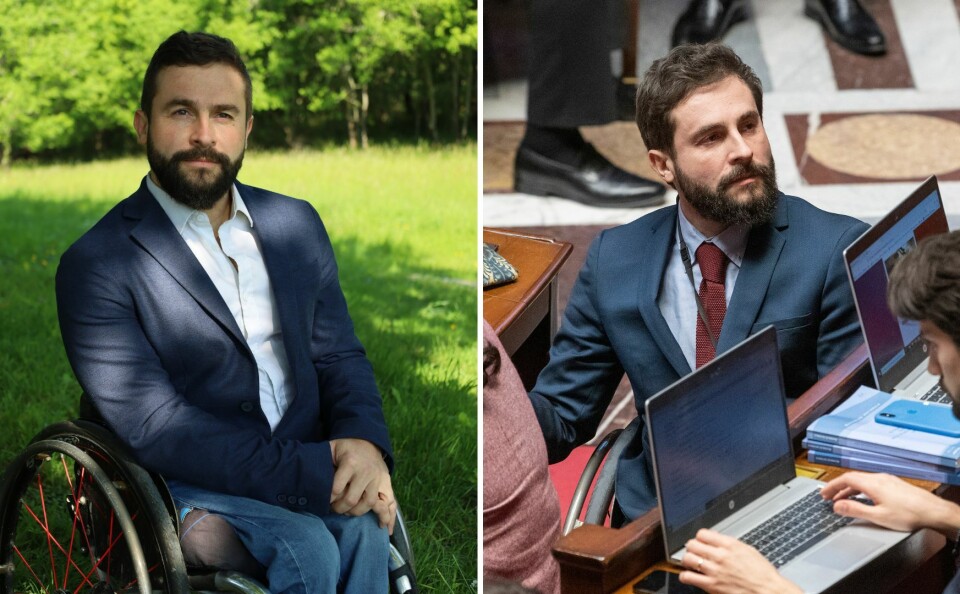-
Local election rule changes in France and why you may have a new mayor in 2026
Communes with fewer than 1,000 residents are particularly set to see changes from next year
-
Ballet lessons bring health benefits to over-55s in France
Online classes with the Silver Swans are transforming lives of older adults
-
Profile: Dorothée - France's beloved TV icon and screen mum
Profile of the singer, actress and TV presenter who captivated millions of schoolchildren
‘French society is built around the economy not the right to dignity’
We speak to Sébastien Peytavie, a rugby player, psychologist, and the first MP to use a wheelchair at the Assemblée nationale in the Fifth Republic

Seat 491 is unlike any other at the Assemblée nationale; from its position to who occupies it.
On the front rows of the assembly – dedicated to government ministers only – sits Sébastien Peytavie, 41, an ecologist MP for Dordogne’s fourth constituency, and the first wheelchair user under the Fifth Republic.
He is listed in Nupes, a coalition of left-wing parties.
Mr Peytavie – pronounced paye ta vie – sits in this spot, following works carried out at the Assemblée nationale to allow him to access the space, and therefore to participate comfortably in the legislative activity of the nation.
His first question to the government, on January 24, 2023, came after a seven-month spell in hospital, something which attracted journalists who had consistently profiled him by emphasising his condition.
Mr Peytavie’s life in a wheelchair was the result of a heart operation that went wrong when he was three years old.
But he does not want to be defined by that condition, as can plainly be seen by how he describes himself as an MP on his Facebook page.
Unhappy about state of France’s public services
Mr Peytavie grew up in Borrèze (Dordogne) in a family that ran la Ribambelle, a charity to help children with difficult home lives.
He graduated with a Master’s in psychopathology in 2006 and worked as an educator for two years before opening a psychologue practice, and has worked at Sarlat’s public hospital in Dordogne since 2019.
He is proud to have won several trophies as a forward in the wheelchair Rugby league team of Cahors.
He did not swerve questions about his condition but gave perspective of the challenges still facing France around accessibility for disabled people, hoping he could set an example in politics.
But he also shared what he hopes for France in general, his stay at the hospital having confirmed what he already knew about the state of France’s public services.
Read more: Seven questions about ‘medical deserts’ in France
You are the first MP wheelchair user under the Fifth Republic. What work at the Assemblée nationale was required to facilitate your movements?
The main problem for architects was the auditorium, as every other room except this one had already been adapted for disabled people with elevators and wheelchair ramps.
The auditorium is one of the oldest areas of the building and a very narrow environment with seats so tiny and cramped it was impossible for me to access them.
The solution was to place me where MPs sit with a folding console.
I was not very hopeful about the work.
I had imagined a sort of table with wheels that anyone could move around, with a casing dedicated to cast ballots. They came up with this solution that far exceeded my expectations.

Photo: Solution to auditorium access exceeded Mr Peytavie’s expectations; Credit: Photothèque Assemblée Nationale
You know, I come from Sarlat in Dordogne where questions around accessibility are central because of the many medieval buildings there. It is hard to make them accessible without diminishing their charm and character.
When you see such dedication for an MP, would you not like the State to treat all disabled citizens like this? Isn’t it double standards?
(Laughs). It should be the rule. But it is already the case in many buildings since they have to follow rules that include more accessibility requirements.
Of course, I would like everyone to be welcomed the way I was at the Assemblée nationale.
Are you surprised to be the first?
Yes and no. Yes, because there is nothing to stop you from being an MP, except perhaps your imagination.
When I competed to become a European MP, at first I thought it was not for me.
But if everyone with a slightly different background talked themselves out of trying, we shouldn’t be surprised at seeing the same old profiles.
If we want to see other types of people representing us, we must give ourselves the best chance to become them.
Functional disabilities in particular are always valued through sport. It’s true that there isn’t much valorisation other than through sport. There is a little bit through cinema.
Once I was elected, many disabled people contacted me to say that they were happy to have someone in their situation who could represent them. I think that this can give ideas to others.
What is your take on the fight for accessibility for disabled people?
Getting around is catastrophic.
We are going to have a rather extraordinary spotlight with the Olympic Games in 2024 in Paris, a city with only one metro line accessible to disabled people.
When 10,000 athletes and spectators travel around areas to attend games, I don’t know how we’re going to manage.
The government’s plan is to pay for taxis. But the price of a taxi is not the same as a metro ticket.
Despite all the infrastructure improvements made for the Olympic Games, nothing has improved for people with disabilities.
In Dordogne, I take the train to Souillac where staff are not trained to take a disabled person on the train.
SNCF pays for a taxi to Brive station to get me on the train.
These are just some of the things that go against the European rules of no discrimination on accessibility issues. But for now, France is far from achieving this.
Does it require more education?
Training, I would say. Over the last 20 years, the way people look at disability has changed.
People are less surprised or embarrassed. But when there are teachers without disability training and you want to encourage inclusive schools, it’s terrible.
Architects work with specifications and standards, but when you book a hotel room for disabled people, it’s always bland.
We need to create something both accessible and beautiful.
You have been interviewed in La Croix and Libération, yet your political career is described from the perspective of your wheelchair. Your Facebook bio does not mention it.
I have never defined myself nor have I presented myself as a person with a disability. It is a reality, I don’t hide it nor could I hide it.
When I was elected, I wanted to be part of the social affairs committee.
The state of hospitals and medical deserts are subjects close to my heart, but the question of disability is also present.
It is obvious that I have something to say and to defend. I realised this when I saw the number of people who responded to me.
Are you not a symbol of hope?
Well, I am one in fact. And it would be stupid not to accept it.
It is obvious that I have legitimacy in this area and that my voice will have greater legitimacy on laws around that issue.
How does one see the world from your seated position? I ask because it seems like this has an important bearing on the issues about which you feel strongly…
This is a very important question.
Remember that a painting will not look the same wherever you stand. Subjectivity plays out through the gaze. Mine is much lower. But it is coupled with a whole childhood history.
I grew up with parents who ran childcare for people with particular life paths.
I learned to watch and listen to difficult life paths. The next logical step was to become a psychologist. Obviously, those who are on the margins of society have accompanied my life path.
How has psychology influenced your political views?
I believe the Freudian theory about epistemological reversal and wish to apply it in politics.
When I craft a law, I want to design something that is as close as possible to the needs and the reality of those who need it most. Politics is about meeting people.
How did your first month at the Assemblée nationale go?
Rough.
From being in a hospital bed to the intensity required at the Assemblée nationale on the most important legislative reform of President Emmanuel Macron’s second term, it was tough.
But it feels good to be here.
Read more: France's pension reforms largely approved as referendum rejected
What did you see during your stay at the hospital?
I already had an idea of the state of French hospitals after having worked there.
In Sarlat, we have an emergency service which has been closed for more than 70 days.
Rural areas do not have the same access to care, education and culture.
This leads to inequalities which impair people’s chances and prospects in life. There is something about the republican promise that is impacted by this.
This is an important issue. When I see the number of elderly people who choose to leave the city to settle in Dordogne for better quality of life and see that the hospital is not always open, it generates anxiety and some eventually leave.
The attractiveness of a region is also determined by its access to public services and care.
What I have seen is healthcare personnel suffering, unhappy with their working conditions and their work despite being dedicated.
Covid has highlighted a healthcare system that is not working.
We have built a model of society since the 1990s that revolves around economic issues.
We have to fit into the sustainability pact, we have to be efficient, etc. This needs to change.
Read more: ‘Prevention will ease healthcare crisis in France’, says minister
During your mandate, what do you most hope to change?
Our axis is the right to a dignified life.
It’s quite a catch-all phrase, but it can be applied in any form.
Health is an essential issue. This is also why the retirement reform is nonsense.
Increasing the retirement age by two years means taking away two years of healthy life from many people, even more considering that life expectancy has decreased with Covid.
Our health is also directly impacted by global warming, our lifestyle and the food we eat.
We have built a system where everyone should have access to food, but we don’t care about its quality.
The most precarious are those most likely to eat low-quality food, and who are therefore the most likely to be obese, with all the health risks that this entails.
Related articles
What are the key parts of the French government’s 100-day action plan?
Is there help available to install a stairlift at a home in France?
Is my UK blue disabled parking badge valid in France?
























